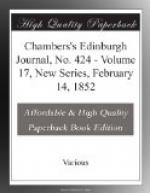Unless people know how to prepare food, they may starve in the midst of comparative plenty. It is alleged—though we do not vouch for the fact—that when wheat and maize were carried into Ireland and given gratis, the famine was not stayed. Though they had the wheat and maize, they could not grind them; if ground, they could not cook them—they had neither vessels nor fuel; if vessels and fuel were given, they were still unable to assist themselves—they had not skill to cook them; and if cooked, they could not eat them—they had never been accustomed to do so! Such are the effects of carrying contentment too far: the individual becomes wholly resourceless.
We try to induce them to fish with the same results. If we give them boats, they have no nets; give them nets, they know not how to use them; teach them to use them, and they can neither cook nor eat the fish; and as to selling them for other comforts, there is no market! Without a knowledge of agriculture, or fishing, or even talents to feed themselves, such men are useless in any quarter, unless as subjects to be taught; and now at last, but greatly too late, they are being taught, and the much-abused railway will carry their produce to the market.
The Scottish Celt is more shifty. In the old days when he had flesh and little else to eat, he could broil it on the coals; and a Scotch collop is perhaps equal to a Turkish kebob. We wonder if in Australia the long-forgotten Scotch collop has been revived? It requires no cooking-vessels. It may be held to the fire on a twig, or laid on the coals and turned by a similar twig—bent into a collop-tongs—or even by the fingers.
In the Rebellion of 1745, the Scoto-Celt could knead into a cake the meal, which he carried as his sole provision, and knew that it ought to be fired upon a griddle; but if he had no other convenience, he could knead it in his bonnet, and eat it raw, and go forth to meet and conquer the best-appointed soldiers in Europe. It was only when at last he had neither rest nor food that he was dispersed—not conquered. A lowland Scot is better. With a dish and hot water, and of course the meal and salt, he can make brose, and live and thrive upon it.
How John Bull, who in his own country is carnivorous, and will have his roast-pig on Sunday, if he should slave all the week—how he gets on in a new country, is more doubtful. Very likely, having more wants, he makes more provision for them; but as below a certain rank he is not a writing animal, less is known of his successes or difficulties. For our own part, we think we would have made an excellent Crusoe, and your Crusoe is the only man for a new country.




